| Deviant Art |
10 Questions to Ask Your Beta-readers

Advertisements
Asking for Feedback
Now that NaNoWriMo is over, a lot of us are asking “what’s next”?
I mean, clearly there are those of us, many of us, who either didn’t finish NaNo, or whose NaNo wasn’t long enough to finish our stories, and of course the answer for us is clear – finish that rough draft.
For the rest of you, run your novel through spell-check, do a few read-throughs, make sure your story says what you want it to. I like to print it out at this stage, mark it up, write pages and pages of new material on the back, sort it out by chapter, making index cards for each one… There are a lot of ways to edit it, to clean it up and make it consumable by eyes-that-aren’t-our-own.
But, eventually, we’re going to have to let the manuscript go. To send it to a beta reader for our hopes and dreams to be crushed – or not.
Not all beta-readers are made equally, though. There’s certain things you want to hear from them. Harping on your grammar and syntax is probably not what you’re looking for at this stage, you’re looking for the “Big Picture” feedback. However, that can lead to wishy-washy feedback. Or inconsistent stuff, where different readers focus on different things, or get stuck on one fragment that doesn’t really matter to the rest of the story.
So how do you get useful feedback?
The best way to get something is to ask for it. Wishing and hoping and wondering is all fun and games, but not the most effective way to go about it.
What do you ask for?
When I originally shared a draft of my current work in progress (WIP), I sent my readers this questionnaire: things for them to think of during their read, and to answer (so much as they felt like) when they finished.
I’d researched what to ask readers and then I narrowed it down to these 10 key questions.
10 Questions to Ask Your Beta Reader
- Did the story hold your interest from the very beginning? If not, why not?
- Did the setting interest you, and did the descriptions seem vivid and real to you?
- Was there a point at which you felt the story started to lag or you became less than excited about finding out what was going to happen next? Where, exactly?
- Were there any parts that confused you? Or even frustrated or annoyed you? Which parts, and why?
- Did you notice any discrepancies or inconsistencies in time sequences, places, character details, or other details?
- Were the characters believable? Are there any characters you think could be made more interesting or more likable?
- Did the dialogue keep your interest and sound natural to you? If not, whose dialogue did you think sounded artificial or not like that person would speak?
- Did you feel there was too much description or exposition? Not enough? Maybe too much dialogue in parts?
- Was there enough conflict, tension, and intrigue to keep your interest?
- Was the ending satisfying? Believable?
I admit it, it was hard to limit myself to ten. I consider the bonus questions mostly ego-stroking, but useful information!
Bonus Questions:
– Which parts resonated with you and/or moved you emotionally?
– Are there parts where you wanted to skip ahead or put the book down?
– Which parts should be condensed or even deleted?
– Which parts should be elaborated on or brought more to life?
– Which characters did you really connect to? (None is acceptable)
– Are there parts where you wanted to skip ahead or put the book down?
– Which parts should be condensed or even deleted?
– Which parts should be elaborated on or brought more to life?
– Which characters did you really connect to? (None is acceptable)
Anything my questionnaire misses that you find as vital feedback?
Advertisements
Advertisements
MORGAN S HAZELWOOD
Writer in Progress
#WRITINGTIPS
3 Things To Consider Before “Fixing” Your Writing
3 Things To Consider Before “Fixing” Your Writing
How Do You Please Everyone With Your Writing?
Spoiler Alert: You can’t.
I’m back in the query trenches again, alternately deciding that “this is the agent for me!” and “no agent will ever love me!”
So, while I’m sorting through agent profiles, trying to decide who might “swipe right” back at me (right’s the one where they’re interested, too? I don’t know these things), I see agents posting about what they don’twant.
And there’s this knee-jerk reaction, when I recognize a trope from my writing in their ‘no thank you’ list. The feeling of, “Oh! I can fix it! And then you’ll love it!” Especially when you see so much of your story in their ‘please send me’ list.
But before you go an fix your story to appeal to that agent, you need to stop and consider a few things.
3 Things to Consider before “Fixing” Your Story:
1. Are there other Agents looking specifically for that trope?
If so? Well, there you go!
Just because one agent pooh-poohed the trope you played with in your story, didn’t mean every agent out there was shying away from it. Clearly, that agent just wasn’t the right match for you!
I know it can be hard to walk away from an agent that looks ideal!
You see them asking for X and Y, both of which your story does amazingly! And then you hit that “hard pass if the Manuscript does Z”. *insert screeching to a halt sound clip. And maybe a sad trombone noise*
It’s hard to stop yourself from justifying sending to them anyway. “I have everything they’re looking for,” you think.
Yes, but if you also have something in your manuscript that will make them auto-reject you, why set yourself up for failure?
You’ve heard the dating analogy. Everything else might be good, but if my date is looking for a partner who cooks, we’re not going to be a good fit.
You should be querying people who want what you have to offer, without that deal breaker.
2. Is Not Wanting That Trope A Trend?
Agents are people, and no two people are exactly the same. Which means they have different wants and needs.
If ONE agent talks about not wanting a specific trope, it can be hard not to start reading into what the other agents are saying. You start convincing yourself that the other agents were obliquely referencing that trope and that no one will ever want your novel.
Oh wait–that’s just me.
But EVERY story has its own tropes. It’s how you play with them, subvert them, or make them shine that makes your story unique.
Don’t immediately assume your story is broken! Look around at other agents, at other agencies. Look at what the editors are looking for and see if there’s a pattern.
If, and only if, you find a pattern of agents and editors saying specifically that they do not want this particular trope, that’s when you might think about looking at your manuscript.
3. How well integrated is this trope in your story?
Just because the publishing world isn’t in the mood for this trope, doesn’t mean there’s a problem with your story!
You have to think long and hard before removing a trope from your novel. Start by asking yourself the following questions.
- Does it make sense for your story?
- How will this affect your characters?
- How much of their backgrounds, personality, and goals are influenced by this trope?
- Will your story be worse off by taking it out?
- How well did you write the trope?
- Perhaps you’ve gotten to the heart of the trope and made it real and fully three-dimensional!
- Perhaps you’ve subverted the trope, in an unexpected, but fascinating manner.
- Perhaps you’ve played with the trope, in fun and exciting ways!
If you’ve taken the trope and made it yours, then leave it be!
What Happens If You Leave It In And The Trope Causes People To Reject It?
A – Maybe your story ends up being a ‘practice book’…
It’s still not a waste of time. No one tells the musician who practices their scales that they’ve wasted time.
B – Maybe you need to wait for trends to change.
Shelve this project for 6 months or 6 years, and then send it out to agents again.
Don’t Give Up Hope Before You Query
It could be that your take on this trope is just what the industry has been waiting for!
Advertisements
Report this ad
Report this ad
Share this:
- Click to email (Opens in new window)
- 34Share on Facebook (Opens in new window)34
- Click to share on Google+ (Opens in new window)
- 2Click to share on Pinterest (Opens in new window)2
- Click to share on LinkedIn (Opens in new window)
- Click to share on Reddit (Opens in new window)
- Click to share on Twitter (Opens in new window)
- Click to share on Tumblr (Opens in new window)
So You’re In the Editing Doldrums Again? These 5 Sites Can Help
After you’ve written your novel and revised the BLEEP out of it, one thing remains:
To edit your manuscript!
For those of you who are confused:Revision worries about the characters, the plot, the setting, and the pacing.In other words: The Big Picture.Editing is all about word flow and grammar.In other words: The Details.
Here are the top sites I use when editing my novel.
5 Sites That Can Help You Edit Your Manuscript
1. Do you need a checklist to even know where to start?
One of the most useful checklists I’ve found was at  :
:
It talks about standard grammar mistakes, crutch words, and bad habits.
Now, not all of the things it suggests cutting need to be deleted. Adverbs (often words ending in -ly) and passive voice both have their place, but cutting down on the instances of those things can make your writing stronger.
2. Do you need help replacing your crutch words?
Try your basic, friendly, online thesaurus for help at:
When you’re trying to replace a weak adverb or some passive-voice with a stronger verb, but you can’t think of any? Thesaurus time! (I have to confess, I actually just keep this open on a tab when I’m writing OR editing.)

3. Do you need more accurate terms?
Sometimes, the history of a word can help you find a better term. Just look it up on:
Etymology is the study of language. So, this site tells me where the word came from, similar words in different languages, and words that were used for this term in the past.
So…
When you’re looking for a word that doesn’t sound so modern, so common…
Maybe you’re coming up with a name for a different type of magic?
Try looking up a root word related to the concept you’re attempting to convey and see if a historical version of the word will work. I’ve used this for magical methods, city names, and more.

4 & 5. Do you want to have your prose analyzed?
After you’ve done what you can, it’s time to bring in the hired guns:
Confession? I’m cheap.
I use these tools for free, online. Which means, their use is a little more limited. They won’t analyze my entire manuscript, sometimes even a chapter is too long for them–maybe I need shorter chapters?
But, if I copy/paste a section at a time into the HemingwayApp website or into a new Grammarly document, they will both provide me with a rather comprehensive analysis of my writing. Hemmingway: checking for sentence complexity and word choice, Grammarly: checking, unsurprisingly, my grammar.

With both of these tools, they can only run their algorithms on your writing, they can’t judge its effectiveness, simply the way it adheres to the rules. Thus, some of the feedback should be ignored. But they do give you a good sense of what might make your sentences better. Plus, they make certain when you violate some grammar or writing guideline, you’re doing it on purpose.
With these 5 sites, you can be pretty sure by the time you’re done, that your polished draft is a clean copy, that is easy to read.
Just recognize they can’t actually make your story good, you’ve got to do that on your own.
Share this:
- Click to email (Opens in new window)
- 39Share on Facebook (Opens in new window)39
- Click to share on Google+ (Opens in new window)
- 2Click to share on Pinterest (Opens in new window)2
- Click to share on LinkedIn (Opens in new window)
- Click to share on Reddit (Opens in new window)
- Click to share on Twitter (Opens in new window)
- Click to share on Tumblr (Opens in new window)
6 Tips to Recharge Your Creative Energies
There are times in every writer’s life when they need to step back and refill their creative juices.
Most of us can only write and create, filling all our possible writing time with words, for so long. It doesn’t matter if the words flowed freely from brain to paper, or if each word written was hard won, recharging is a thing that everyone can use from time to time.
And don’t get me started on the doldrums of editing when you’ve done three rounds and you feel like you’ll never finish…
But recharging can look different for different people. So, I thought long and hard–or you know, at least 15 seconds–about how I spend my downtime and asked a few of my writing friends exactly what they do to recharge. Here are six of our answers:
- Ben L says: “I write poetry, because it exercises my writing but in such a different way that it recharges me. Especially form poetry with lots of rhyming and rules, because then I can feel the freedom when I go back to prose. (This can just be limericks if you don’t feel confident in sonnets or villanelles, but haiku doesn’t help much, at least for me.)“
- According to Patrick H., what he needs is something completely different. “I get entirely away from my creative process, usually via computer games. That’s when my characters tell me they’re tired and they need to stop working through drama.” But he adds a caveat to that advice, to be careful what sort of games you’re playing. “I had to stop playing Civ 3 because it was getting in the way of writing, though for a different reason. (Apparently, six-hour gaming sessions on high difficulty levels are tiring?)”
- Kimberly B shares, “I find strolling through a bookstore or library helps invigorate me. It’s also really helpful to have other creative outlets that I have no pressure to be good at. Dancing used to be that for me, before we started performing.“
- Marti P? She says, “I like to search around on Pinterest, read good books in my genre & watch good movies.”
- Anup M likes to “treadmill or take a nap or simply keep it away for a day or two.“
- And me? Well, I like to binge watch Netflicks, read a few books in my massive to-read pile, and try to remember what the gym looks like.
How do you recharge?
P.S. If one eye looks off, I’m recovering from pink eye right now. But! I did manage to rough draft that new opening scene. Waiting on feedback now!
Advertisements
Report this ad
Report this ad
Share this:
- Click to email (Opens in new window)
- 5Share on Facebook (Opens in new window)5
- Click to share on Google+ (Opens in new window)
- Click to share on Pinterest (Opens in new window)
- Click to share on LinkedIn (Opens in new window)
- Click to share on Reddit (Opens in new window)
- Click to share on Twitter (Opens in new window)
- Click to share on Tumblr (Opens in new window)
So You Finished Your Rough Draft, Now What?
Nano is over and with that, the urgency for many writers seems to dissipate once they hit December. For me? The first week of December is often time to catch up on all the chores I let slide while trying to get my words in.
This year, I’m also adjusting to a new sleep schedule for the new job I started the last week of November. And prepping my home for the holidays my family celebrates…
But what about my writing? What about yours?
The Next Steps
Well, the next step depends on you. What do you want to do next? There are two main options and either could be right for you.
First – Take time off
In years past, I’ve taken December off and started again, to finish my work-in-progress (WIP), in January. For many of us, with family obligations or kids having breaks, December is a hard time to create new habits and is rough on the old ones. Be kind to yourself an give yourself permission to take the month off. Or to only work on your writing when you have free time, rather than scheduling everything else around your writing.
Maybe you just need an afternoon. Maybe you only write during NaNoWriMo. Most of us fit somewhere in between.
Second – Decide what your next project should be
NaNoWriMo has a traditional goal – write 50,000 words in 30 days. Not everyone follows those goals, but they’re there if you want to.
But November is over. That means it’s time for you to decide what you should work on next.
Finish your novel
So, if you were writing a rough draft in November, whether you won or not, it’s likely that you still have a ways to go to finish your novel!
Some of you wrote 100,000 words or 500,000 words, some of you barely squeaked out those 50,000 words, and some of you… well, you made some progress. You put words together on paper and you’ve got more than you started November with. Be proud of yourself.
But. Modern novels, at least YA and Adult novels are longer than 50,000 words. usually, they START at 65,000 words, and more fantasy things with a lot of world building can be as long as 120,000 words.
There’s a good chance your story isn’t done yet. In which case, your next project might be finishing your NaNoWriMo project!
Edit your novel
Perhaps you’re like me, this year. For the first time ever, I managed to FINISH my rough draft during NaNo. (With 50,612 words, but still.)
Maybe you’ve decided that you’ve written a novella and you’re okay with that.
Either way, it probably shouldn’t see the light of day, or even the eyes of a supportive alpha (pre-beta-reader) before you’ve done a read through and edit.
While gunning for word count and trying to skip editing, writers often end up with confusing word choices, sentences that are out of place, and plot holes you could drive a tank through.
If nothing else, do a line edit to make sure your story is readable. If possible, do a light revision, checking the pacing, verifying that the story order makes sense, and minimizing plot holes.
Start something new
Maybe you’re sick and tired of that novel from November.
The deadlines and panic, (or simply the concept itself), sucked the enthusiasm and joy from the story for you, leaving a lifeless husk of a story on your hard drive.
Maybe you pushed the Nano inhibition limits and are left with something you never want to see again.
Maybe you didn’t even do NaNoWriMo.
Maybe you just need a break.
In any case? Were there any other story ideas that started flirting with you? Trying to distract you from your NaNo project? And ideas that have been rolling around in the back of your head for days, or weeks, or years?
Go ahead and give it life!
Finish something old
Did you abandon or neglect an older project in favor of the new and shiny project for NaNoWriMo? Or choose to take a break for NaNo so you could come back to it fresh?
Maybe NaNo had nothing to do with it, but you still have that old story, sitting in a drawer somewhere.
Now could be the time to pull it out, reread it to see where it’s at and decide. Is it worth saving? What does it need? Massive revisions? Line edits? The ending written? A new first chapter and a coat of fresh paint?
Third – Set Achievable Goals (either now, or after a break)
So, now you’ve decided what you’re working on next. How do you find that momentum you had during NaNoWriMo? You set yourself some achievable goals.
For finishing your novel or starting something new
Word count goals, as you may have discovered, are helpful.
Outside of NaNoWriMo, I’ve usually set a smaller goal than 50,000 words. Obviously, your goal should be based on your life, your writing speed, and your availability.
- I’ve aimed for 10,000 words before and found that actually a bit short–as soon as I started getting into the writing flow, my words for the week would be done.
- 20,000/25,000 was a manageable goal with downtime, but steady progress. In which I could take a few days off.
For editing or finishing something old
I spend a lot more time editing than writing. But editing per word is hard to track, you’re adding and deleting… so what sort of measurement can you do? Editing pages!
Even if you delete some, or add some. You can still see how far through the original draft you’ve come.
- I’ve aimed for editing 10 pages per editing session.
- Some evenings I’ve managed 3 editing sessions before bed.
- There have been times I’ve managed 1 editing session in a week.
- Don’t forget to take the time to plot.
- Go through your novel, summarize each chapter, and look at the big picture.
- How is the pacing?
- Are there plot holes?
- Feel free to take time off from story editing and just do search-replace style editing.
- Look for crutch words(very/just) or passive voice (am/is /was/were /be/being /been) and see if you can replace with stronger verbs.
- Note: I usually try to halve my count for every overused word, so I keep track. I like metrics, I may have mentioned before.
- Look for crutch words(very/just) or passive voice (am/is /was/were /be/being /been) and see if you can replace with stronger verbs.
What Is Morgan Up To?
Now, shortly before NaNoWriMo, I got the most treasured type of rejection letters on my novel, “Flesh and Ink”. The one with feedback. That I had a good idea how to implement!
So, my plan for this month is to write a new first chapter and update the old first chapter to work with it. Beginnings are hard. Pacing is tricky, and since my story is fantasy, it’s hard to set the scene, describe the stakes and consequences, and introduce you to the characters and world without feeling like I’m cramming everything in, and sprinkling info-dumps on top…
Wish me luck! And best of luck with your next project.
Advertisements
Report this ad
Report this ad
Share this:
- Click to email (Opens in new window)
- 18Share on Facebook (Opens in new window)18
- Click to share on Google+ (Opens in new window)
- Click to share on Pinterest (Opens in new window)
- Click to share on LinkedIn (Opens in new window)
- Click to share on Reddit (Opens in new window)
- Click to share on Twitter (Opens in new window)
- Click to share on Tumblr (Opens in new window)
How To Write: You Do You!
How To Write: You Do You!
The Many Writing Proverbs
There’s a caveat that goes with pretty much all writing advice about what you SHOULD do, and it goes like this: “unless that doesn’t work for you.”
It seems to go hand-in-hand with the advice about what you SHOULDN’T do’s caveat, which is “if you do it well enough, you can break all the rules.”
‘Cause, remember, all the people giving this advice swear by the adage, “if you know how to write a book, you know how to write that one book.”
I can spout off writing proverbs and rules all day:
- Write every day – unless that doesn’t work for you.
- Avoid adverbs, use stronger verbs instead – unless you can make it work
- Passive voice must be avoided at ALL COSTS- unless you can make it work
So, I’ve been spouting all this advice. How about I tell you how I’m actually doing?

My Nano Status
So far, this NaNoWriMo, I’m keeping up with my words. Getting over the daily target, sometimes by the skin of my teeth, never really getting ahead. The steady, forward progress works for me. I’ve got that 1-2 hours a day to devote (or carve out) for it, and I make it work.
What If You Can’t Find The Time?
“Write Every Day” – writing proverb
Many of you can’t find that sort of time regu larly. Instead, you carve out larger chunks once or twice a week and slug your way through thousands of words in a go.
larly. Instead, you carve out larger chunks once or twice a week and slug your way through thousands of words in a go.
 larly. Instead, you carve out larger chunks once or twice a week and slug your way through thousands of words in a go.
larly. Instead, you carve out larger chunks once or twice a week and slug your way through thousands of words in a go.
I’ve written over 3,000 words in a day maybe 3 times ever? That’s not how I work. But if you can make it work–more power to you!
Some of you can only find 10-15 minute blocks, on your lunch break, on your commute, whenever you can squeeze in some words. I’ve done that here and there, but I know how hard it is to keep it coherent and track your line of thinking. I’m impressed by you!
What If You Can’t Write Enough Words?
“Write until you hit your word count target” – writing ‘proverb’
(Okay, that one might just be an adage of NaNoWriMo, not actually a writing proverb.)
Many of you can’t write fast enough or find the right words, and the monthly word target is slowly slipping further and further from your stalled out word count. Research is distracting you. Or the next plot point is eluding you.
Don’t be discouraged! Is your word count higher than it was last week? Then you’re still moving forward!
Some people revise the target and make it work in their lives, not outside of it. And that’s okay.
Maybe 30 in 30 is right for you
Some people are aiming for 30,000 words in 30 days, not the full 50k. And that’s still pretty durn impressive.
Is 5 in 5 a thing?
Maybe it should be.
Is 5,000 words in 5 weeks something you could be proud of?
It’s still 5,000 more words than you started the month with. (Plus, it’s a nice round number with a cutesy rhyme, how can you go wrong with that?!)
Should You Participate In Writing Sprints?
Writing sprints are kinda a new thing for me. I’d ‘participated’ in them once or twice before. Some rando on twitter would say ‘go’, and then ‘stop’. Or I’d time myself, but there was no accountability.
This time, I checked out the NaNoWriMo Word Sprints and set up a couple with friends. Usually, starting them at the nearest quarter-hour without much prep time.
I’ve done about 7 now and I’m REALLY liking them. Tonight, I got my words in before this post with 15 minutes on, 15 minutes off, with a little bit of clean-up and internet browsing in my downtime.
I create the sprint, share it, and then go. I’ve got a set stop time– that seems just a little too long, a touch of competitiveness — both with any other sprinters who clicked my link to join the sprint and with my past records of how many words I got in that time frame before, and usually, in the 3-5 minutes after creating the sprint, before it starts, I think ahead about half-a-scene’s worth, to decide exactly where the scene is going.
When my computer cheers for me to start, I’m ready.
I’ve decided 15 minutes is the sweet spot. Any longer and I’d be taking breaks, I know. I’m already starting to flounder and contemplate where to go next. At 10 minutes though, I’m still in the middle of my initial thought.
But for some, sprints are stressful. Or discouraging when you see other people’s word counts. Maybe when you’re online doesn’t synch up with your friends? No matter your reason, it’s perfectly fine to write without sprints.
What About Write-ins?
Some people love them. The focus on writing, everyone there working on the adult version of toddler parallel-play. Being surrounded by people who understand the writing bug and are focused on their writing can be very invigorating for some people’s writing.
Some Write-ins are chatty and social and next-to-no-words get written.
Some write-ins are silent, and you hear everyone typing away while you’re sitting there wordless, feeling like a loser.
Some people enjoy the time out of the house, the change of scenery, and make it work for them.
Personally? I like the slightly chatty, but mostly focused ones, where I can get cookies to snack on.
Hating write-ins doesn’t make you a bad NaNite. Loving them doesn’t mean you’re suddenly an extrovert.* (P.S. Extroverts can be writers, too! Ask me how I know.)
 Writing Soundtracks!
Writing Soundtracks!
Some people love soundtracks. They almost spend more prep time making their playlist than writing any sort of outline.
Some people enjoy playlists. I like to hit Pandora, find a seed-song that sets the mood for me, and roll from there.
Some people can’t write to certain kinds of music. Maybe they find music with words they can sing with too distracting. Maybe musicals? Maybe classical? Find what you can and can’t work with.
Some people like rocking out. Some people prefer to jam privately, with headphones.
And some? Some can’t do BLEEP with background noise. They need silence to focus. And that’s okay! [I totally get this! I can’t edit to music, I need the silence to think.]
In Conclusion
There are as many ways to write as there are writers. You do you.
P.S. Check out my NaNoWriMo Posts from the Past!
Maintaining Your Writing Momentum
Tips For Finding The Time and The Words
So You Want To Be A Writer
Twas The Week Before NaNo
It’s a Marathon, Not a Sprint
An Outline To Write By (for Plantsers and Plotters)
How to win NaNoWriMo
3 Things That Helped Me Win NaNoWriMo early
Craft Vs Professionalism
Tips For Finding The Time and The Words
So You Want To Be A Writer
Twas The Week Before NaNo
It’s a Marathon, Not a Sprint
An Outline To Write By (for Plantsers and Plotters)
How to win NaNoWriMo
3 Things That Helped Me Win NaNoWriMo early
Craft Vs Professionalism
Advertisements
Report this ad
Report this ad
Share this:
- Click to email (Opens in new window)
- 21Share on Facebook (Opens in new window)21
- Click to share on Google+ (Opens in new window)
- Click to share on Pinterest (Opens in new window)
- Click to share on LinkedIn (Opens in new window)
- Click to share on Reddit (Opens in new window)
- Click to share on Twitter (Opens in new window)
- Click to share on Tumblr (Opens in new window)
Advertisements
Report this ad
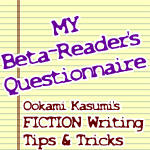
My Beta-Readers Questionnaire
- by OokamiKasumi, Feb 1, 2010, 12:05:45 PM
- Resources & Stock Images / Tutorials / Writing
Anyone who writes with the intent to be read by the public, from the brand-name published authors to the fan-fiction scribbler, will tell you that a good Beta Reader is worth their weight in GOLD.
So, what is a Beta Reader really FOR?
Most Beta Readers look for obvious grammar boo-boos and glaring spelling errors, but the really good ones look at your story as a whole and tell you where your strengths and weaknesses are so you can adjust them.
These are what I ask MY Beta readers to check.
-- Whether you're a Writer looking to check your work or a Beta Reader who wants to point out a few things to your favorite writer, feel free to borrow, spindle, and mutilate this list of questions to your heart's desire.
~~~~~~~~~~~~~~~
MY Beta-Reader's Questionnaire
~~~~~~~~~~~~~~~
Is it BORING?
~~~~~~~~~~~~~~~
- Does any part of the story Drag?
- Are their parts that you skipped to get to 'the good part'?
- Do I over-inform anywhere? (Also known as Info-Dumping.)
Did you Get it?
~~~~~~~~~~~~~~~
- Did you understand every phrase / term I used?
- If someone unfamiliar with this Fandom read this, have I explained enough for them to understand WHY everything was happening?
-!- Did I forget to mention that someone was demon-possessed, half angelic, or had mystical powers?
Love Scenes?
~~~~~~~~~~~~~~~
- Do any of the love scenes seem overly cliché? (Or overly sappy?)
- Were the love scenes too fast, too slow, or too frequent?
- Did you have to reread any part of the love scenes to understand who was doing what to whom?
- Did the actions and positions flow smoothly from one to the next, or did they jump as though something was skipped?
- Did it make you hot?
-!- Was your Comfort-Zone line crossed? (Did any actions in the love scene make you cringe?)
Do the scenes FLOW?
~~~~~~~~~~~~~~~
- Does one scene lead logically into the next?
- Is there enough downtime between intense scenes to allow it to build to the next?
- Were the Flashbacks smoothly integrated to fit into the current scene -- or did they seem plopped in, like a chapter that was in the wrong place?
- Do I repeat whole scenes that Don't need to be repeated?
- Was there a nice clean scene-break or chapter break between each change in point of view?
Is anything VISUALLY Confusing?
~~~~~~~~~~~~~~~
- Can you SEE every action clearly in your mind like a movie?
- Could you SEE what the characters looked like clearly?
- Could someone who was Not familiar with the fandom SEE what the characters looked like clearly?
- If you went there in real life, would you recognize the location?
- Did you have to reread any part of the action sequences to understand who did what?
-!- Did I forget to describe their Clothes, their Hair, their Eyes, any other distinctive feature that pertains to a specific character?
During DIALOGUE scenes?
~~~~~~~~~~~~~~~
- Could you see what the characters were DOING while talking?
- Could you see WHERE the characters were while talking?
Did the Characters WORK?
~~~~~~~~~~~~~~~
- Do the characters ACT realistic?
- Does the Dialogue sound realistic?
- Do their Reactions seem logical & realistic?
- Could you feel the Emotions between the characters?
- Did the characters seem IN CHARACTER?
- Did the characters with mystical powers USE them in the story?
-!- Would Original characters have worked better for this story?
- What character did you like best and WHY?
- What character did you hate and WHY?
- What character got on your nerves and WHY?
- Does any one character get in the way of the STORY?
- Was there a character that would have made the story Better by being Left Out?
~~~~~~~~~~~~~~~
The answers to these burning questions will keep your fiction crisp, focused and Popular. If your Beta readers like it then loads of other people will too.
I still think that if George Lucas had used a few test readers for those last three Star Wars movies, the scenes with Aniken as a child would have been much shorter--and made more sense. Jar Jar Binks would never have appeared. The romance between Aniken and Amidala would have been a Romance, and the clone war would have been a frikkin clone War. But that's just MY opinion...
Enjoy!
So, what is a Beta Reader really FOR?
Most Beta Readers look for obvious grammar boo-boos and glaring spelling errors, but the really good ones look at your story as a whole and tell you where your strengths and weaknesses are so you can adjust them.
These are what I ask MY Beta readers to check.
-- Whether you're a Writer looking to check your work or a Beta Reader who wants to point out a few things to your favorite writer, feel free to borrow, spindle, and mutilate this list of questions to your heart's desire.
~~~~~~~~~~~~~~~
MY Beta-Reader's Questionnaire
~~~~~~~~~~~~~~~
Is it BORING?
~~~~~~~~~~~~~~~
- Does any part of the story Drag?
- Are their parts that you skipped to get to 'the good part'?
- Do I over-inform anywhere? (Also known as Info-Dumping.)
Did you Get it?
~~~~~~~~~~~~~~~
- Did you understand every phrase / term I used?
- If someone unfamiliar with this Fandom read this, have I explained enough for them to understand WHY everything was happening?
-!- Did I forget to mention that someone was demon-possessed, half angelic, or had mystical powers?
Love Scenes?
~~~~~~~~~~~~~~~
- Do any of the love scenes seem overly cliché? (Or overly sappy?)
- Were the love scenes too fast, too slow, or too frequent?
- Did you have to reread any part of the love scenes to understand who was doing what to whom?
- Did the actions and positions flow smoothly from one to the next, or did they jump as though something was skipped?
- Did it make you hot?
-!- Was your Comfort-Zone line crossed? (Did any actions in the love scene make you cringe?)
Do the scenes FLOW?
~~~~~~~~~~~~~~~
- Does one scene lead logically into the next?
- Is there enough downtime between intense scenes to allow it to build to the next?
- Were the Flashbacks smoothly integrated to fit into the current scene -- or did they seem plopped in, like a chapter that was in the wrong place?
- Do I repeat whole scenes that Don't need to be repeated?
- Was there a nice clean scene-break or chapter break between each change in point of view?
Is anything VISUALLY Confusing?
~~~~~~~~~~~~~~~
- Can you SEE every action clearly in your mind like a movie?
- Could you SEE what the characters looked like clearly?
- Could someone who was Not familiar with the fandom SEE what the characters looked like clearly?
- If you went there in real life, would you recognize the location?
- Did you have to reread any part of the action sequences to understand who did what?
-!- Did I forget to describe their Clothes, their Hair, their Eyes, any other distinctive feature that pertains to a specific character?
During DIALOGUE scenes?
~~~~~~~~~~~~~~~
- Could you see what the characters were DOING while talking?
- Could you see WHERE the characters were while talking?
Did the Characters WORK?
~~~~~~~~~~~~~~~
- Do the characters ACT realistic?
- Does the Dialogue sound realistic?
- Do their Reactions seem logical & realistic?
- Could you feel the Emotions between the characters?
- Did the characters seem IN CHARACTER?
- Did the characters with mystical powers USE them in the story?
-!- Would Original characters have worked better for this story?
- What character did you like best and WHY?
- What character did you hate and WHY?
- What character got on your nerves and WHY?
- Does any one character get in the way of the STORY?
- Was there a character that would have made the story Better by being Left Out?
~~~~~~~~~~~~~~~
The answers to these burning questions will keep your fiction crisp, focused and Popular. If your Beta readers like it then loads of other people will too.
I still think that if George Lucas had used a few test readers for those last three Star Wars movies, the scenes with Aniken as a child would have been much shorter--and made more sense. Jar Jar Binks would never have appeared. The romance between Aniken and Amidala would have been a Romance, and the clone war would have been a frikkin clone War. But that's just MY opinion...
Enjoy!
FEATURED IN COLLECTIONS
- Get link
- X
- Other Apps
- Get link
- X
- Other Apps

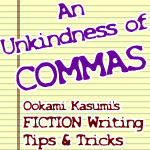
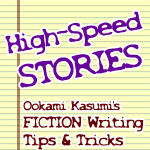
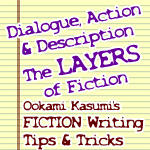
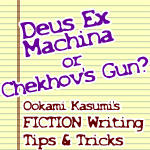
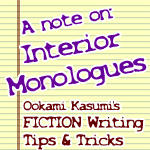
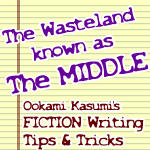
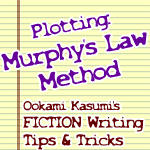
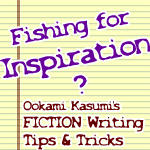
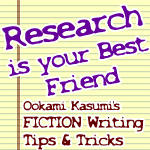
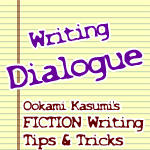
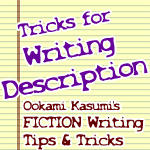
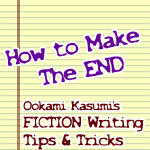
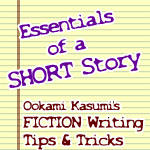
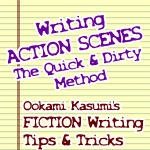
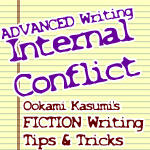
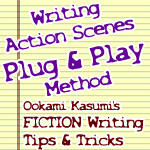
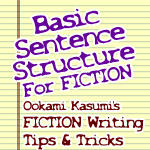
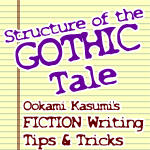
:origin()/pre00/7d6a/th/pre/i/2009/282/d/0/writing_tips___grammar__pt_3_by_mae_jay.jpg)
:origin()/pre00/e1d4/th/pre/i/2009/282/e/5/writing_tips___grammar__pt_1_by_mae_jay.jpg)
:origin()/pre00/6469/th/pre/i/2009/349/e/2/point_of_view_by_mae_jay.jpg)
:origin()/pre00/0a19/th/pre/i/2009/352/f/7/punchlines_and_pay_offs_by_mae_jay.jpg)
:origin()/pre00/8741/th/pre/i/2010/062/6/6/writing_tips___getting_started_by_mae_jay.jpg)
:origin()/pre00/87ab/th/pre/i/2009/282/1/c/writing_tips___grammar__pt_2_by_mae_jay.jpg)
:origin()/pre00/9ac4/th/pre/f/2010/185/3/7/writer_notes___characters_by_darkdelusion.jpg)
:origin()/pre00/2422/th/pre/i/2009/282/b/2/research__how_to_do_it_by_mae_jay.jpg)
:origin()/pre00/ebf2/th/pre/f/2010/185/e/8/writers_notes___tools_by_darkdelusion.jpg)
Comments
Post a Comment